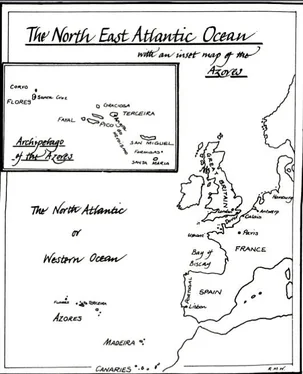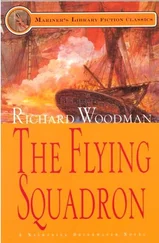'What the ... ?'
Drinkwater turned, feeling the young man's vain attempt to seize him, then quickly reacted and seized Marlowe's outstretched hand.
'Come, sir, steady there! What the devil's the matter?'
Marlowe regained his balance, but lost his aplomb. 'I beg pardon, sir,' he gabbled all in a breath, 'but I wondered if you have any orders, sir.'
Had Drinkwater not been so dog-tired and had he not been almost asleep on his feet, he might have been in a better humour and laughed at the young officer's discomfiture. Reluctant to leave the deck, yet content to abandon matters to Birkbeck's competence, he had been languishing in the comfortable compromise of a reverie. As it was, only the helmsmen laughed surreptitiously, while Drinkwater showed a testy exasperation.
'Mr Birkbeck?' he called sharply.
'Sir?' Birkbeck came up the sloping deck with a practised, almost, Marlowe thought, insulting ease.
'What orders d'you have?'
'Why, sir, to keep her full-and-bye and make the best of our way down Channel.'
Drinkwater turned his gaze on Marlowe. 'There, Mr Marlowe, does that satisfy you?'
'Well, not really sir. I had hoped that you might confide in me, sir.'
'Confide in you, sir? If you sought a confidence, should not you have been on deck earlier, Mr Marlowe, when we were getting under weigh? After all, you knew of our visitor last night.'
'Well, sir, you did not condescend to inform me of anything consequent upon your visitor. As you know, under normal circumstances as first lieutenant I should not keep an anchor watch, but having done so since we were engaged upon a special duty, I had turned in and there was nothing in your night orders to suggest...'
'That you had to forgo your breakfast, no, of course not; but you are first lieutenant of a frigate on active service.'
'Active service, sir?' Marlowe frowned, looking round at Birkbeck who caught his eye and turned away. 'I do not think I quite understand, sir.'
'I am very certain you do not understand, Mr Marlowe.'
'But sir,' Marlowe's tone was increasingly desperate, 'might I not be privy to ... ?'
'No sir, you may not. Not at this moment. If Lieutenant Colville was sent out of hearing while His Royal Highness', Drinkwater invoked the pompous title with a degree of pleasure, sure that it would silence his tormentor, 'gave me my orders, I do not think it appropriate that I confide in you, do you?'
Crestfallen and confused, Marlowe mumbled a submissive 'No, sir.'
'Very well, Mr Marlowe, then let's hear no more of the matter until we are out of soundings.'
Marlowe's mouth dropped open in foolish incredulity. 'Out of soundings ... ?'
Astonishment lent volume to Marlowe's exclamation; Ashton caught it, downwind across the deck, and dropped his jaw in imitation of his senior; Birkbeck caught it and sighed an old man's sigh; Midshipman Dunn caught it and his eyes brightened at the prospect of adventure, and the helmsmen caught it silently, mulling it over in their minds until, relieved of their duty, they would release it like a rat to run rumouring about the berth-deck.
As for Drinkwater, he felt ashamed of his peevishness; this was not how he had hoped to let his ship's company know they were outward bound for the Atlantic Ocean, nor was it how he should have treated his first lieutenant. If he had not been so damned tired ... He sighed and stared to windward. The comfortable mood eluded him. The little encounter with Marlowe upset him and left his mind a-whirl again.
As soon as Andromeda had cleared Dungeness, Drinkwater went below. He was exhausted and, removing his hat, coat and shoes, loosed his stock and tumbled into his swinging cot. He thought for a moment that even now he would be unable to sleep, for his mind was still a confusion of thoughts. The enormity of Hortense's news, the possible consequences of it, the attention to the details of informing Elizabeth and making arrangements for his informant, the influencing of Prince William Henry and now the bother of his ship's company and its officers, all tumbled about in his tired head. Each thought followed hard upon its progenitor, and always at the end of the spiral lay the black abyss of what if ... ?
What if they missed the French ships? What if Hortense had lied? What if she told the truth and he miscalculated? What if the Tsar changed his mind? What if ... ? What if ... ? Slowly the thoughts detached themselves, broke up and shrank, slipping away from him so that only the blackness was there, a blackness into which he felt himself fall unresisting, an endless engulfment that seemed to shrink him to nothing, like a trumpet note fading.
Drinkwater woke with a start. Sweat poured from him and his garments were twisted about his body like a torque. He felt bound and breathless. Sweat dried clammily upon him and the latent heat of its evaporation chilled him. There was a dull ache in his jaw. Then he remembered: he had been drowning! He was wet from the sea; gasping from having been dragged beneath something monstrous, but beneath what?
And then the entire dream came back to him: the water, the strange ship, the noise of clanking chains, the white and ghostly figure that had reared above him: Hortense, pallid as a corpse, beautiful and yet ghastly, as though her whole face was riven by scars. Yet the scars were not marks, but the twists of serpents. It was Hortense, but it was also the Medusa which seemed to be borne as a figurehead on the bow of the strange and clattering ship. Then he was under water and lighting for his life as the noise reached a terrifying crescendo from which he knew he must escape, or die.
As he lay mastering his terror, he recognized the old dream. Once, when he was an unhappy midshipman, it had come to him regularly, marking the miserable days of his existence aboard the frigate Cyclops. Since then it had visited him occasionally, as a presentient warning of some impending event. But now he felt no such alarm, as though this terror from his youth could only frighten him when he was weak and exhausted. It was just a visitation from the past; a relic. Old men feared death, not the wearying vicissitudes of misfortune. These, experience taught them, were to be confronted and mastered.
In the past, Hortense's image had sometimes occupied the post of what he had come to call the 'white lady'. Perhaps it was because she had again entered his life that the dream had come roaring out of his subconscious. As he lay there, staring up at the deck-head which glowed in the last reflections of daylight coming in through the stern windows, he mastered the lingering fear which was rapidly shrinking to apprehension. His thoughts ordered themselves slowly but surely, returning him to the state of conscious anxiety from which he had escaped in sleep.
Any analysis of his actions must be seen in the light of good faith. The orders the prompted prince had given him cleared his yard-arm as far as the Admiralty were concerned; all his best efforts must now be bent on reaching the Azores and lying in wait for the French ships. If allied warships brought the Emperor Napoleon to the islands before the French ships arrived, so much the better. Drinkwater would be able to persuade their commanders to remain in the vicinity. If, on the other hand, the French ships lay off the islands in waiting for their Emperor, he would attack them and while he could never guarantee success, he was confident he could sufficiently damage them to prevent them rescuing their prize and carrying out their confounded stratagem.
Then an uncomfortable thought struck him. While he had a full crew, most of which had successfully fought in the Vikkenfiord, his officers were largely inexperienced. It would not have mattered if all they had had to do was act as part of Prince William Henry's Royal Squadron. But now, while his elderly frigate was painted to a nicety, she had not refilled her magazines and was woefully short of powder and ball. True, he had a stock of langridge, grape and musket balls, but there was no substitute for good iron shot. And if that were not enough, he was victualled for no more than a month, two at the most, and carried no spare spars. These thoughts brought him from his bed.
Читать дальше












